

Welcome
Whether you or a loved one has recently been diagnosed with Mast Cell Activation Syndrome (MCAS), or you’re just starting to learn about this complex condition, we want you to know you’re not alone. Understanding MCAS can feel overwhelming at first, with its wide range of symptoms, triggers, and treatments, it’s normal to have many questions and uncertainties.
This page is designed to be your first step towards clarity and confidence, offering reliable, easy-to-understand information and practical guidance.
At Mast Cell Action, we’re committed to providing compassionate support and empowering you with knowledge so you can navigate your journey with hope and strength. Take your time exploring this page, and remember - we’re here for you every step of the way.

What is Mast Cell Activation Syndrome (MCAS)?
MCAS is a condition that can develop in both children and adults. It sits within a spectrum of mast cell disorders and may occur alongside conditions like mastocytosis or hereditary alpha tryptasemia syndrome (HATS). In MCAS, mast cells release chemicals (mediators) too often or in response to things that aren’t usually harmful, such as certain foods, fragrances, or changes in temperature. This can cause a wide range of symptoms affecting different parts of the body.
Triggers and symptoms vary widely between individuals and can change over time, making the condition difficult to manage. In some cases, symptoms become more frequent or severe as the condition progresses. The causes of MCAS aren’t fully understood, but genetics may play a role. For example, HATS is linked to extra copies of the alpha tryptase gene and can be identified with genetic testing. Find out more here.

Diagnosing MCAS
Getting an MCAS diagnosis can take time, as symptoms vary and overlap with other conditions. Many doctors are still unfamiliar with the condition, and testing can be inconsistent. Diagnosis is usually based on:
- Multi-system symptoms that come and go and may worsen with stress or illness
- Improvement with mast cell medications, known as a medication trial
- Lab tests for chemical mediators like methylhistamine or prostaglandins, taken during a symptom flare
- Ruling out other conditions with similar symptoms, such as asthma or ME/CFS
There’s currently no genetic test for MCAS, but research is ongoing.

Living with MCAS
Living with Mast Cell Activation Syndrome can be challenging, especially when symptoms are unpredictable and vary from day to day. You may find yourself reacting to things that never used to be a problem - like certain foods, fragrances, temperature changes, or stress - and it can take time to identify your personal triggers.
Many people with MCAS go through periods of trial and error while learning how to manage their condition. Finding the right combination of medication, lifestyle adjustments, and support can make a real difference. This might include pacing your activities, keeping a symptom diary, avoiding known triggers, or working with healthcare professionals who understand mast cell conditions.
Find out more about managing MCAS here.

First steps after diagnosis
Receiving a diagnosis of Mast Cell Activation Syndrome can bring a mix of emotions - relief at having an explanation, but also uncertainty about what comes next. It’s normal to feel overwhelmed at first, but there are steps you can take to begin building a sense of control and confidence.
Start by learning as much as you can at a pace that works for you. Keeping a symptom and trigger diary can help you and your doctors spot patterns over time. Many people begin treatment by introducing medications slowly and carefully, as those with MCAS can be sensitive to changes. Your healthcare team may suggest a “low and slow” approach to dosing, which is often more successful.
You might find it helpful to make simple changes to your environment, such as reducing exposure to fragrances or strong cleaning products, and exploring gentle ways to support your wellbeing, including rest, stress reduction, and pacing your activities.
You don’t have to figure everything out on your own. There’s a growing community of people living with MCAS who truly understand what you're going through. At Mast Cell Action, we’re here to support you with trusted information, connection, and encouragement as you begin this new phase of your journey.

Where to get support
You don’t have to face MCAS alone. Support can make a real difference - whether you're newly diagnosed or have been managing symptoms for a while.
At Mast Cell Action, we offer a range of free support services to help you feel heard, understood, and connected. These include:
- Online events, peer support groups and webinars on topics like symptom management, pacing, and self-advocacy
- One-to-one support for those needing tailored guidance
A private Facebook community offering day-to-day encouragement and shared experience
- Resources to help you talk to doctors, schools, and employers
You can also sign up as a Friend of Mast Cell Action to receive regular updates, helpful tools, and opportunities to get involved.
Whether you're looking for practical advice, emotional support, or just someone who gets it — we’re here for you.

What you’ll find here
Resources on this page will help you:
- Understand what mast cells are and how MCAS affects the body
- Recognise common symptoms and triggers
- Learn about diagnosis and treatment approaches
- Find practical next steps after diagnosis
You are not alone. Many people with MCAS take time to find answers, but support and understanding can make a real difference.

Supporting someone with MCAS at Christmas
A practical festive guide for loved ones, who are supporting those with MCAS at Christmas
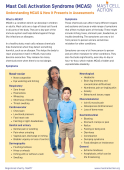
MCAS information for PIP assessors
This resource provides assessors with an overview of MCAS, how it affects daily living, and the support individuals may need, helping ensure assessments are safe, fair and based on an understanding of the condition’s fluctuating nature.

Managing MCAS At Christmas
The festive season can be joyful, but for those living with MCAS, it can also bring extra challenges - new foods, busy gatherings, extra stress and exposure to different things. This guide offers practical ideas to help you plan ahead, look after yourself, and enjoy the parts of Christmas that feel right for you.

Quick Guide to MCAS for Loved-Ones
MCAS is a complex condition and can be hard for our loved-ones to understand. However, their support is crucial for us to be able to manage our condition well. This handy Quick Guide to MCAS is designed to help your loved-one understand MCAS and begin to learn how they can help you. Share this with your loved-ones, so that they can easily understand what MCAS is.
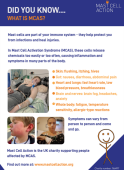
DID YOU KNOW.... What is MCAS?
This poster provides brief facts about MCAS. These are great for sending to friends and family to help them understand or for taking to medical appointments.
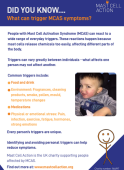
DID YOU KNOW.... What can trigger MCAS symptoms?
This poster provides brief facts around Triggers and MCAS. These are great for sending to friends and family to help them understand or for taking to medical appointments.

DID YOU KNOW.... Fragrances can make people ill
This poster provides brief facts around fragrances and MCAS. These are great for sending to friends and family to help them understand or for taking to medical appointments.
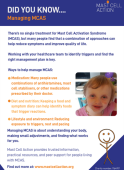
DID YOU KNOW.... Managing MCAS
This poster provides brief facts around managing MCAS. These are great for sending to friends and family to help them understand or for taking to medical appointments.

A Quick Guide to MCAS
A handy 2 page Quick Guide to MCAS. An easy to read and understand overview of mast cells, MCAS symptoms, triggers, management, treatment and the histamine bucket theory.

Nourishing Health and Happiness with MCAS
We have worked with registered dietitian, Chloe Hall, to explore some of the most common diets followed by people with MCAS, and the key nutritional concerns that often arise. In this resource, we’ll look at practical ways to support your diet when living with MCAS.
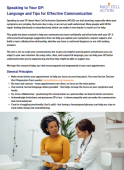
Speaking to Your GP: Language and Tips for Effective Communication
This guide has been created to help you communicate more confidently and effectively with your GP. It offers practical language suggestions that can help you explain your symptoms, request support, and build a more collaborative relationship, whether you have a confirmed diagnosis or are still seeking answers.
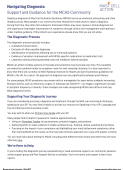
Navigating Diagnosis: Support and Guidance for the MCAS Community
This guide is designed to support individuals in the MCAS community who are navigating the challenges of seeking a diagnosis.

Gratitude Handout
Use this journal however feels right for you. There’s no pressure to write every day or find something profound. Some days, it might be a kind word from a friend, a moment of peace, or simply managing to eat a safe meal. These moments matter. You matter.
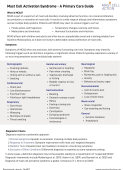
Mast Cell Activation Syndrome - A Primary Care Guide
A primary care guide to Mast Cell Activation Syndrome. It outlines common triggers, diagnostic criteria, and key symptom patterns affecting various body systems, helping clinicians recognise and differentiate MCAS from other conditions.

Understanding MCD by Roselle P. O'Brien LMHC
A 'Not-Just-For-Therapists' Guide....." This is written as a guide for therapist’s to help them understand Long Covid, Mast Cell Activation Syndrome (MCAS), Mast Cell Disorders (MCD), Chemical Sensitivities and Environmental Illness. However, it is not just for therapists, and others may also find it very useful.
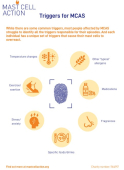
Triggers
This resource details some of the more common triggers of Mast Cell Activation Syndrome.
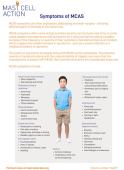
Symptoms of MCAS
This resource details some of the more common symptoms of Mast Cell Activation Syndrome.
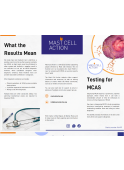
MCAS Testing
This leaflet documents some of the tests that may be used to diagnose MCAS and explains how to read the results.

Reasonable adjustments in the workplace full pack
This is our full pack with multiple resources to support requesting reasonable adjustments in the workplace with MCAS.

Understanding your rights and advocating for yourself in the workplace - a guide for people with MCAS
This guide helps you to understand your rights and the support that could be put into place in your workplace to help you.

MCAS for employers
This guide for employers explains MCAS and the support that could be put into place in the workplace for those with MCAS.
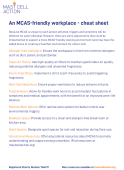
An MCAS-friendly workplace - cheat sheet
This cheat sheet has top tips that might be helpful when creating an MCAS-friendly work place.
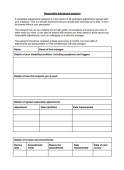
Reasonable adjustment passport
A workplace adjustments passport is a live record of all workplace adjustments agreed with your employer.

Template for requesting reasonable adjustments
This template may be helpful when requesting reasonable adjustments from your employer.
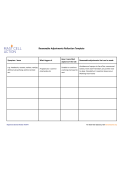
Reasonable Adjustments Reflection Template.
This table may support you to break down the reasonable adjustments that could be made to support you in your workplace.
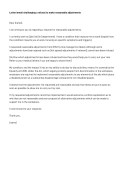
Letter challenging a refusal to make reasonable adjustments
This letter may be useful if you need to challenge a refusal to implement reasonable adjustments in your workplace.
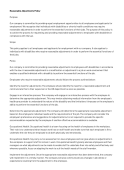
Reasonable Adjustments Policy Template
This template policy can be shared with your workplace to support the development and implementation of a reasonable adjustment policy.

MCAS for Disability Officers
This information guide about MCAS, and the additional needs a student with MCAS may have, can be shared with Disability Officers and other members of staff at universities.

MCAS and higher education
This resource has been designed to provide general guidance and help students to access support as they approach further education at university.

The histamine bucket exercise
This histamine bucket is a useful visual aid in trying to understand the impact of factors contributing to histamine levels.

Swiss Interest Group Histamine Intolerance (SIGHI)
SIGHI is an organisation that provides information about histamine-related disorders.
The low histamine chef
Blogs, books and recipes written by the low histamine chef (Yasmina Ykelenstam), a health journalist who has managed her own histamine intolerance for more than 10 years.
Mast Cell Action Brochure _ B&W

Doctor visit preparation form
A form designed to help you to plan the questions you would like to ask and symptoms you would like to discuss at medical appointments.
Mast Cell Action Brochure; September 2020
Our brochure about MCAS, including what is MCAS? Triggers and symptoms, diagnosis and management.
Become a friend
Sign up to become a Friend of Mast Cell Action so we can keep you up to date on our progress and on how to get involved in our latest campaigns and initiatives.
Donate
Mast Cell Action relies entirely on the generosity of people like you. Please make a donation now and together we can make a difference to those affected by MCAS.







